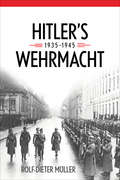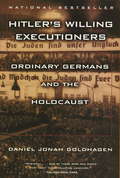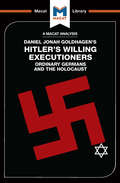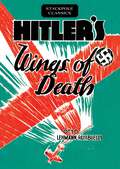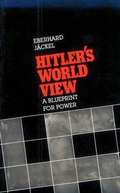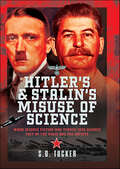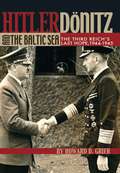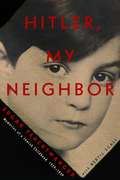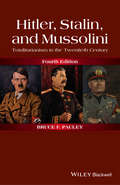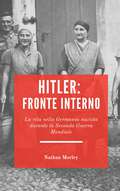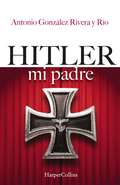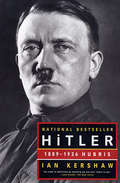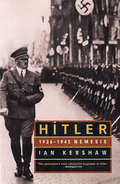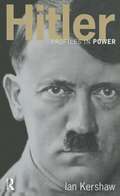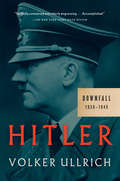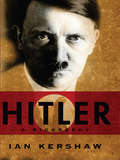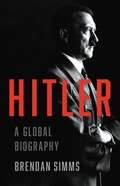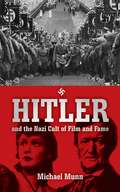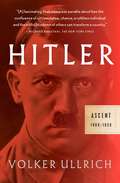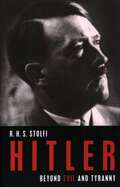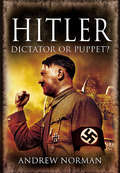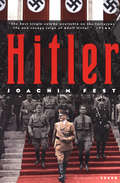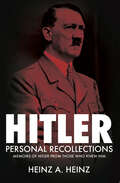- Table View
- List View
Hitler's Wehrmacht, 1935–1945 (Foreign Military Studies)
by Rolf-Dieter MüllerAn &“impressively comprehensive&” study of the Nazi military and its culpability in war crimes by &“one of the foremost historians of World War II&” (Stephen G. Fritz, author of Ostkrieg). Since the end of World War II, Germans have struggled with the legacy of the Wehrmacht—the unified armed forces mobilized by Adolf Hitler in 1935. Historians have vigorously debated whether the Wehrmacht's atrocities represented a break with the past or a continuation of Germany's military traditions. Now available for the first time in English, this meticulously researched yet accessible overview by eminent historian Rolf-Dieter Müller provides a comprehensive analysis of the Wehrmacht, illuminating its role in the horrors of the Third Reich. Müller examines the Wehrmacht's leadership principles, organization, equipment, and training, as well as the front-line experiences of soldiers, airmen, Waffen SS, foreign legionnaires, and volunteers. He skillfully demonstrates how state-directed propaganda and terror influenced the extent to which the militarized citizenry—or Volksgemeinschaft—was transformed under the pressure of total mobilization. Finally, Müller evaluates the army's conduct during the war, from blitzkrieg to the final surrender and charges of war crimes. Brief acts of resistance, such as an officers' &“rebellion of conscience&” in July 1944, embody the repressed, principled humanity of Germany's soldiers. But ultimately, Müller concludes, the Wehrmacht became the &“steel guarantor&” of the criminal Nazi regime.
Hitler's Willing Executioners: Ordinary Germans and the Holocaust
by Daniel Jonah GoldhagenThis groundbreaking international bestseller lays to rest many myths about the Holocaust: that Germans were ignorant of the mass destruction of Jews, that the killers were all SS men, and that those who slaughtered Jews did so reluctantly. Hitler's Willing Executioners provides conclusive evidence that the extermination of European Jewry engaged the energies and enthusiasm of tens of thousands of ordinary Germans. Goldhagen reconstructs the climate of "eliminationist anti-Semitism" that made Hitler's pursuit of his genocidal goals possible and the radical persecution of the Jews during the 1930s popular. Drawing on a wealth of unused archival materials, principally the testimony of the killers themselves, Goldhagen takes us into the killing fields where Germans voluntarily hunted Jews like animals, tortured them wantonly, and then posed cheerfully for snapshots with their victims. From mobile killing units, to the camps, to the death marches, Goldhagen shows how ordinary Germans, nurtured in a society where Jews were seen as unalterable evil and dangerous, willingly followed their beliefs to their logical conclusion. "Hitler's Willing Executioner's is an original, indeed brilliant contribution to the. . . literature on the Holocaust."--New York Review of Books "The most important book ever published about the Holocaust. . . Eloquently written, meticulously documented, impassioned. . . A model of moral and scholarly integrity."--Philadelphia Inquirer
Hitler's Willing Executioners: Ordinary Germans and the Holocaust
by Simon Taylor Tom StammersDaniel Goldhagen's study of the Holocaust offers conclusions that run directly counter to those reached by Christopher Browning, whose book Ordinary Men is also the subject of a Macat analysis. As such, the two analyses make possible some interesting critical thinking exercises focused on evaluation of the evidence used by the two historians. For Goldhagen, a chief reason for German actions was not the mundane good comradeship stressed by Browning, but a longstanding hatred of Jews and Judaism specific to Germany that dated back well into the previous century. Debating which historian is right, which has made better use of the available evidence, which has most successfully written objectively – and which advances the most secure interpretation of contested documents – forces students to think critically about one of the most important and (on the surface at least) incomprehensible events of the past century.
Hitler's Wings of Death (Stackpole Classics)
by Otto Lehmann-RussbueldtHow big is Germany&’s Air Force?Of what is it capable?Is Hitler preparing for battle?Will Germany wage and air-war?These questions, and many more, are answered in this book. Concisely, employing a lucid style which will be refreshing to American readers, Herr Lehmann-Russbueldt states the case of Hitler&’s rapidly growing air corps.First-hand information is divulged, unassailable facts are presented, and everyone—students of international affairs or not—will lay down this book with a greater knowledge and a truer realization of the martial situation prevelant in Germany under Der Fuehrer.
Hitler's World View: A Blueprint for Power
by Eberhard Jäckel Herbert ArnoldEven the demonic Hitler had a comprehensive philosophy, and Jäckel probes deeply into the dictator's mind to determine how he viewed the world.
Hitler's and Stalin's Misuse of Science: When Science Fiction was Turned into Science Fact by the Nazis and the Soviets
by S. D. TuckerS.D. Tucker delves into the Nazi and Soviet historical hijacking of science by extreme ideologies, revealing the dangerous consequences of pseudoscientific narratives in today's world. In today’s world, science itself, which we are constantly being told is a neutral vehicle for wholly objective ideas and theories, is increasingly being hijacked and abused by the toxic modern cult of identity politics, of both left and right. But should we be too surprised by any of this? No, because this exact same sorry process has happened time and again before, under the rule of totalitarian political cults like the Nazis and the Soviets, both of which vigorously promoted various pseudoscientific theories of ‘Aryan Science’ and ‘Marxist Science’ on the sole grounds that they were ideologically correct as opposed to being factually so. Nazi racial pseudoscience and belief in nonsense like the ‘World Ice Theory’, which claimed that stars did not really exist and were actually just reflections of the sun off giant floating space-icebergs, were widely encouraged in the Third Reich, and used for long-term military weather-forecasting purposes. Likewise, the ideas of the renegade biologist Trofim Lysenko, who developed a deluded ‘anti-capitalist’ theory of genetics opposed to Darwin’s, were responsible for widespread famine in the USSR when Stalin allowed him to apply them practically towards the nation’s crop-harvests. Those academics and functionaries who disputed these clearly false pseudoscientific notions often found themselves in deep trouble – or, ultimately, dead. In this incisive and challenging study, author S.D. Tucker explores the often weird and fanciful theories that were proposed and took hold under these extreme regimes – and in doing so sends a word of warning to the modern world of the internet and social media where similar bizarre ideas are expounded and consumed with frightening gullibility. Everywhere from Western universities, schools and hospitals to Vladimir Putin’s Russia, absurd stories of sexist glaciers, racist gravity, socialist trees and NATO-backed mutant extra-terrestrial potatoes are being promoted as items of politically mandated scientific fact by compliant collaborators and credulous social media followers. Pseudoscientific narratives are even now used to justify the 2022 invasion of Ukraine, much as they were once used to justify the Nazi conquest of Europe or the spread of Communist revolution across the globe.
Hitler, Donitz, and the Baltic Sea
by David GrierThe popular conception of Hitler in the final years of World War II is that of a deranged Fuhrer stubbornly demanding the defense of every foot of ground on all fronts and ordering hopeless attacks with nonexistent divisions. To imply that Hitler had a rational plan to win the war flies in the face of widely accepted interpretations, but historian Howard D. Grier persuasively argues here that Hitler did possess a strategy to regain the initiative in 1944-45 and that the Baltic theater played the key role in his plan.In examining that strategy, Grier answers lingering questions about the Third Reich's final months and also provides evidence of its emphasis upon naval affairs and of Admiral Karl Donitz's influence in shaping Hitler's grand strategy. Donitz intended to starve Britain into submission and halt the shipment of American troops and supplies to Europe with a fleet of new Type XXI U-boats. But to test the new submarines and train their crews the Nazis needed control of the Baltic Sea and possession of its ports, and to launch their U-boat offensive they needed Norway, the only suitable location that remained after the loss of France in the summer of 1944.This work analyzes German naval strategy from 1944 to 1945 and its role in shaping the war on land in the Baltic. The first six chapters provide an operational history of warfare on the northern sector of the eastern front and give evidence of the navy s demands that the Baltic coast be protected in order to preserve U-boat training areas. The next three chapters look at possible reasons for Hitler's defense of the Baltic coast, concluding that the most likely reason was Hitler's belief in Donitz's ability to turn the tide of war with his new submarines. A final chapter discusses Donitz's personal and ideological relationship with Hitler, his influence in shaping overall strategy, and the reason Hitler selected the admiral as his successor rather than a general or Nazi Party official. With Grier's thorough examination of Hitler's strategic motives and the reasons behind his decision to defend coastal sectors in the Baltic late in the war, readers are offered an important new interpretation of events for their consideration.
Hitler, My Neighbor: Memories of a Jewish Childhood, 1929-1939
by Adriana Hunter Edgar Feuchtwanger Bertil ScaliAn eminent historian recounts the Nazi rise to power from his unique perspective as a young Jewish boy in Munich, living with Adolf Hitler as his neighbor. Edgar Feuchtwanger came from a prominent German-Jewish family--the only son of a respected editor and the nephew of a best-selling author, Lion Feuchtwanger. He was a carefree five-year-old, pampered by his parents and his nanny, when Adolf Hitler, the leader of the Nazi Party, moved into the building opposite theirs in Munich. In 1933 the joy of this untroubled life was shattered. Hitler had been named Chancellor. Edgar's parents, stripped of their rights as citizens, tried to protect him from increasingly degrading realities. In class, his teacher had him draw swastikas, and his schoolmates joined the Hitler Youth. Watching events unfold from his window, Edgar bore witness to the Night of the Long Knives, the Anschluss, and Kristallnacht. Jews were arrested; his father was imprisoned at Dachau. In 1939 Edgar was sent on his own to England, where he would make a new life, a career, have a family, and strive to forget the nightmare of his past--a past that came rushing back when he decided, at the age of eighty-eight, to tell the story of his buried childhood and his infamous neighbor.
Hitler, Stalin, and Mussolini: Totalitarianism in the Twentieth Century (European History Ser.)
by Bruce F. PauleyThe fourth edition of Hitler, Stalin, and Mussolini: Totalitarianism in the Twentieth Century presents an innovative comparison of the origins, development, and demise of the three forms of totalitarianism that emerged in twentieth-century Europe. Represents the only book that systematically compares all three infamous dictators of the twentieth century Provides the latest scholarship on the wartime goals of Hitler and Stalin as well as new information on the disintegration of the Soviet empire Compares the early lives of Hitler, Stalin, and Mussolini, their ideologies, rise to and consolidation of power, and the organization and workings of their dictatorships Features topics organized by themes rather than strictly chronologically Includes a wealth of visual material to support the text, as well as a thorough Bibliographical Essay compiled by the author
Hitler, fronte interno: La vita nella Germania nazista durante la Seconda Guerra Mondiale
by Nathan MorleySpaziando dai drammatici eventi che hanno interessato il fronte orientale alle più semplici difficoltà domestiche affrontate dalle donne di casa costrette ad arrangiarsi con cibi sintetici e surrogati, “Hitler, fronte interno” costituisce un interessante ed esaustivo resoconto anno per anno della vita durante la II Guerra Mondiale in Germania, ricco di aneddoti relativi a cittadini comuni che, per quanto possibile, tentavano di trovare un briciolo di normalità durante un’emergenza senza precedenti. Questo libro è stato scritto grazie a preziose risorse che hanno permesso all’autore di ricostruire piccoli e grandi eventi: razionamenti, crimini, restrizioni, bombardamenti e malcontento generale della popolazione sono tra i principali argomenti trattati. I giornali ufficiali dell’epoca come “Das Reich”, “Völkischer Beobachter” e “Der Angriff” mostrano come i cittadini siano stati informati, non sempre in maniera veritiera, dei successi e fallimenti della propria Nazione durante il periodo bellico. Anche stralci di quotidiani e periodici tedeschi, insieme a relazioni delle forze dell’ordine, diari dei cittadini e dei gerarchi stessi, discorsi, lettere inedite, trasmissioni del “Deutsche Wochenschau” e testimonianze dirette sono di fondamentale importanza per la costruzione di un’immagine dell’epoca nazista.
Hitler, mi padre
by Antonio González Rivera y RíoCuando el Ejército Rojo está a punto de conquistar Berlín, a finales de la Segunda Guerra Mundial, en el cuartel general de Hitler se Fragua el más arriesgado de los planes: la huida de Hitler y su esposa Eva Braun; pero más aún, de su mayor secreto: le existencia de sus dos hijos. En esta estremecedora novela, un hombre se atreve e contar su historia: la de cómo descubrió que es el hijo del hombre más temido y más odiado del siglo XX.
Hitler: 1889-1936 Hubris
by Ian KershawThis is a biography of Hitler from birth to 1936, and his creation of The Third Reich, i.e., Nazi Germany.
Hitler: 1889-1936 Hubris
by Ian KershawHailed as the most compelling biography of the German dictator yet written, Ian Kershaw's Hitler brings us closer than ever before to the heart of its subject's immense darkness. From his illegitimate birth in a small Austrian village to his fiery death in a bunker under the Reich chancellery in Berlin, Adolf Hitler left a murky trail, strewn with contradictory tales and overgrown with self-created myths. One truth prevails: the sheer scale of the evils that he unleashed on the world has made him a demonic figure without equal in this century. Ian Kershaw's Hitler brings us closer than ever before to the character of the bizarre misfit in his thirty-year ascent from a Viennese shelter for the indigent to uncontested rule over the German nation that had tried and rejected democracy in the crippling aftermath of World War I. With extraordinary vividness, Kershaw recreates the settings that made Hitler's rise possible: the virulent anti-Semitism of prewar Vienna, the crucible of a war with immense casualties, the toxic nationalism that gripped Bavaria in the 1920s, the undermining of the Weimar Republic by extremists of the Right and the Left, the hysteria that accompanied Hitler's seizure of power in 1933 and then mounted in brutal attacks by his storm troopers on Jews and others condemned as enemies of the Aryan race. In an account drawing on many previously untapped sources, Hitler metamorphoses from an obscure fantasist, a "drummer" sounding an insistent beat of hatred in Munich beer halls, to the instigator of an infamous failed putsch and, ultimately, to the leadership of a ragtag alliance of right-wing parties fused into a movement that enthralled the German people. This volume, the first of two, ends with the promulgation of the infamous Nuremberg laws that pushed German Jews to the outer fringes of society, and with the march of the German army into the Rhineland, Hitler's initial move toward the abyss of war.
Hitler: 1936-1945 Nemesis
by Ian KershawThe climax and conclusion of one of the best-selling biographies of our time. The New Yorker declared the first volume of Ian Kershaw's two-volume masterpiece "as close to definitive as anything we are likely to see," and that promise is fulfilled in this stunning second volume. As Nemesis opens, Adolf Hitler has achieved absolute power within Germany and triumphed in his first challenge to the European powers. Idolized by large segments of the population and firmly supported by the Nazi regime, Hitler is poised to subjugate Europe. Nine years later, his vaunted war machine destroyed, Allied forces sweeping across Germany, Hitler will end his life with a pistol shot to his head. "[M]ore probing, more judicious, more authoritative in its rich detail...more commanding in its mastery of the horrific narrative."--Milton J. Rosenberg, Chicago Tribune
Hitler: 1936-1945 Nemesis (Profiles In Power)
by Ian KershawAdolf Hitler has left a lasting mark on the twentieth-century, as the dictator of Germany and instigator of a genocidal war, culminating in the ruin of much of Europe and the globe. This innovative best-seller explores the nature and mechanics of Hitler's power, and how he used it.
Hitler: 1939-1945 (Hitler Biographies Ser. #2)
by Volker UllrichFrom the author of Hitler: Ascent, 1889-1939--a riveting account of the dictator's final years, when he got the war he wanted but his leadership led to catastrophe for his nation, the world, and himself. In the summer of 1939 Hitler was at the zenith of his power. The Nazis had consolidated political control in Germany and a series of foreign-policy coups had restored Germany to the status of a major world power. He now embarked on realizing his lifelong ambition: to provide the German people with the resources they needed to flourish and to exterminate those who stood in the way. Yet despite a series of stunning initial triumphs, Hitler's decision to invade the Soviet Union in 1941 turned the tide for good.Now, Volker Ullrich offers fascinating new insight into Hitler's character and personality, vividly portraying the insecurity, obsession with minutiae, and narcissistic penchant for gambling that led Hitler to overrule his subordinates and then blame them for his failures; and, ultimately, when he realized the war was not winnable, to embark on the annihilation of Germany itself in order to punish the people who he believed had failed to hand him victory. This is a masterful account of a spectacular downfall, and an essential addition to our understanding of Hitler and the Second World War.
Hitler: A Biography (Atalaya Ser. #Vol. 55)
by Ian Kershaw"Magisterial . . . anyone who wishes to understand the Third Reich must read Kershaw."--Niall Ferguson "The Hitler biography of the twenty-first century" (Richard J. Evans), Ian Kershaw's Hitler is a one-volume masterpiece that will become the standard work. From Hitler's origins as a failed artist in fin-de-siecle Vienna to the terrifying last days in his Berlin bunker, Kershaw's richly illustrated biography is a mesmerizing portrait of how Hitler attained, exercised, and retained power. Drawing on previously untapped sources, such as Goebbels's diaries, Kershaw addresses the crucial questions about the unique nature of Nazi radicalism, about the Holocaust, and about the poisoned European world that allowed Hitler to operate so effectively. Some images in the ebook are not displayed owing to permissions issues.
Hitler: A Global Biography
by Brendan SimmsFrom a prize-winning historian, the definitive biography of Adolph HitlerHitler offers a deeply learned and radically revisionist biography, arguing that the dictator's main strategic enemy, from the start of his political career in the 1920s, was not communism or the Soviet Union, but capitalism and the United States. Whereas most historians have argued that Hitler underestimated the American threat, Simms shows that Hitler embarked on a preemptive war with the United States precisely because he considered it such a potent adversary. The war against the Jews was driven both by his anxiety about combatting the supposed forces of international plutocracy and by a broader desire to maintain the domestic cohesion he thought necessary for survival on the international scene.A powerfully argued and utterly definitive account of a murderous tyrant we thought we understood, Hitler is essential reading for anyone seeking to understand the origins and outcomes of the Second World War.
Hitler: A Portrait of a Tyrant
by Albert MarrinA biography of the struggling Austrian artist who rose from obscurity to power as the leader of the Nazi party and, later, the German nation, and whose ambitions led the world to war.
Hitler: And the Nazi Cult of Film and Fame
by Michael MunnA shocking look into the twisted, lurid world of Nazi Germany’s film industry. In Nazi Germany, the cult of celebrity was the embodiment of Adolf Hitler’s style of cultural governance. Hitler’s rise to power owed much to the creation of his own celebrity, and the country’s greatest stars, whether they were actors, writers, or musicians, could be one of only two things: If they were compliant, they were lauded and awarded status symbols for the regime; but if they resisted—or were simply Jewish—they were traitors to be interned and murdered. This fascinating analysis offers a shocking portrait of a Hitler shaped by aspirations to Hollywood-style fame, of the correlation between art and ambition, of films used as weapons, and of sexual predilections. The Führer believed he was an artist, not a politician, and in his Germany, politics and culture became one. His celebrity was cultivated and nurtured by Joseph Goebbels, Germany’s supreme head of culture. Hitler and Goebbels enjoyed the company of beautiful female film stars, and Goebbels had his own “casting couch.” In Germany’s version of Hollywood, there were scandals, starlets, secret agents, premieres, and party politics. The Third Reich would launch filmmaker and actress Leni Riefenstahl to prominence by making her its own glorifying documentarian, most famously in The Triumph of the Will, the innovative film starring Hitler and widely considered to be one of the greatest propaganda movies ever made. It is no coincidence that Eva Braun, Hitler’s longtime partner and wife for the two days leading up to their joint suicide, was a photographer, and in fact shot most of the surviving photographs and film footage of her lover. In this “creepy yet compelling who’s-who of collaboration in the big-screen industry during the Nazi era,” film historian Michael Munn “offers a hard-driving study of Hitler’s music and film obsessions and the sacrifice of untold talent and youth to the murderous Nazi ideology” (Kirkus Reviews). Hitler and the Nazi Cult of Film and Fame also reveals previously unpublished information about the “Hitler film,” which Goebbels envisaged as “the greatest story ever told,” although it was ultimately trumped by the dictator’s own, real-life Wagnerian finale.
Hitler: Ascent, 1889-1939
by Volker UllrichA New York Times 2016 Notable BookA major new biography—an extraordinary, penetrating study of the man who has become the personification of evil.“Ullrich reveals Hitler to have been an eminently practical politician—and frighteningly so. Timely… One of the best works on Hitler and the origins of the Third Reich to appear in recent years.” —Kirkus Reviews“An outstanding study… All the huge, and terrible moments of the early Nazi era are dissected…but the real strength of this book is in disentangling the personal story of man and monster.” —The Guardian (U.K.) For all the literature about Adolf Hitler there have been just four seminal biographies; this is the fifth, a landmark work that sheds important new light on Hitler himself. Drawing on previously unseen papers and a wealth of recent scholarly research, Volker Ullrich reveals the man behind the public persona, from Hitler's childhood to his failures as a young man in Vienna to his experiences during the First World War to his rise as a far-right party leader. Ullrich deftly captures Hitler's intelligence, instinctive grasp of politics, and gift for oratory as well as his megalomania, deep insecurity, and repulsive worldview. Many previous biographies have focused on the larger social conditions that explain the rise of the Third Reich. Ullrich gives us a comprehensive portrait of a postwar Germany humiliated by defeat, wracked by political crisis, and starved by an economic depression, but his real gift is to show vividly how Hitler used his ruthlessness and political talent to shape the Nazi party and lead it to power. For decades the world has tried to grasp how Hitler was possible. By focusing on the man at the center of it all, on how he experienced his world, formed his political beliefs, and wielded power, this riveting biography brings us closer than ever to the answer.Translated from the German by Jefferson Chase.
Hitler: Beyond Evil and Tyranny (German Studies)
by R. H. StolfiThis fascinating and richly detailed new biography of Hitler reinterprets the known facts about the Nazi Fuehrer to construct a convincing, realistic portrait of the man. In place of the hollow shell others have made into an icon of evil, the author sees a complex, nuanced personality. Without in any way glorifying its subject, this unique revision of the historical Hitler brings us closer to understanding a pivotal personality of the twentieth century.
Hitler: Dictator or Puppet?
by Andrew NormanWritten by an authority on Adolf Hitler, this book charts new ground and shows how the writings of a deluded ex-monk, Lanz von Liebenfels and the pseudo-science of Liebenfels and other writers, convinced Hitler that Germanys destiny was to save the world from a Jewish-Bolshevik conspiracy. It was this perverted sense of destiny that drove the Nazi Party and led to the outbreak of WWII and the deaths of some sixty million people as well as the destruction of much of Europe. Using the writings of Liebenfels from his magazine Ostara, Dr Andrew Norman demonstrates how the mass murders of Jews, Gypsies, mentally-ill people and those regarded as less than human had its roots in articles written by Liebenfels. An index of Ostara articles is included and their very titles indicate the malign influences that shaped Hitlers Germany.
Hitler: Eine Biographie (Pelican Ser.)
by Joachim C. FestA bestseller in its original German edition and subsequently translated into more than a dozen languages, this book has become a classic portrait of a man, a nation, and an era. Index. Translated by Richard and Clara Winston. A Helen and Kurt Wolff Book
Hitler: Memoirs of Hitler From Those Who Knew Him
by Heinz A. HeinzHeinz A. Heinz was the only writer authorised by the Nazi Party to draw a biography of the Fhrer for publication in the English speaking world. The result was the 1938 authorised biography of Adolf Hitler entitled Germany's Hitler.The book was based on interviews supplied first hand by those friends, helpers and comrades who had believed in him from the beginning of his political career. Heinz A. Heinz was a professional journalist and author, he interviewed Hitler's old school friends, army colleagues, landlords, his jailer, and early party comrades including an invaluable interview with Anton Drexler to produce an unprecedented insight into Adolf Hitler as viewed by his acquaintances during the inter-war period.These remarkable interviews were given by those who had stood by him in his darkest days, and who lived to see one of the most astounding political achievements in history. Included are vivid and unique descriptions of Hitler at school, his First World War battlefield experiences, the early political struggles, the full story behind the 9th November Beer Hall Putsch, Hitler in prison, and the struggle to power from 1926 to 1933.Featuring a new introduction by Emmy Award winning writer and historian Bob Carruthers, this book is a vital primary source reference work for anyone interested in understanding how and why Hitler won the total adulation and support of such a large section of the German people.
